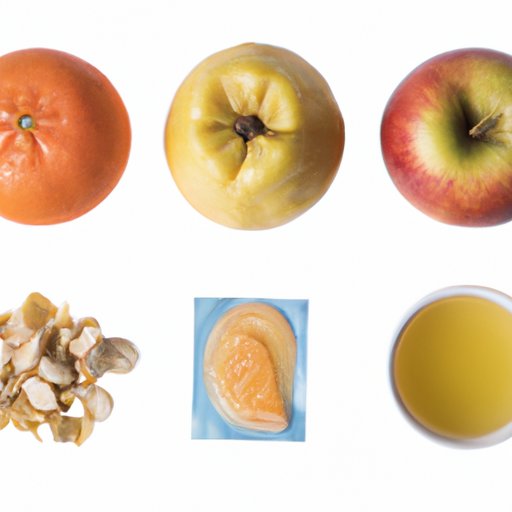
Introduction
Throwing up bile can be an uncomfortable and sometimes alarming experience. Bile is a yellow or greenish fluid produced in the liver and stored in the gallbladder. It helps digest fats and eliminate waste from the body. Vomiting bile occurs when it gets regurgitated back up into the stomach and esophagus. Understanding the causes, remedies, and treatments for bile vomiting can help you manage the condition and avoid discomfort.
Causes of Bile Vomiting and How to Prevent It
There are several reasons why people vomit bile. These include:
- Hungry stomach: When the stomach is empty, bile can travel up the digestive tract and cause discomfort.
- Gastrointestinal disorders: Conditions like gastroesophageal reflux disease (GERD), peptic ulcers, and irritable bowel syndrome (IBS) can cause bile to reflux into the esophagus and cause vomiting.
- Excessive alcohol consumption: Alcohol can irritate the stomach lining and cause an increase in stomach acid that can lead to bile vomiting.
- Food poisoning: When the body detects harmful bacteria or viruses in the digestive system, it may produce more bile to eliminate these pathogens which can lead to vomiting.
To prevent bile vomiting, it is crucial to understand what triggers the symptoms. Here are some tips on how to avoid bile vomiting:
- Stay hydrated: Drinking plenty of water and electrolyte-rich fluids like coconut water can help prevent dehydration and reduce the chance of bile reflux.
- Maintain a healthy diet: Eating small, frequent meals throughout the day can help regulate bile production and avoid triggering an empty stomach.
- Keep a food diary: Tracking your diet can help you identify foods that cause bile vomiting and take steps to avoid them in the future.
Natural Remedies for Bile Vomiting
If you experience symptoms of bile vomiting, several natural remedies can help alleviate discomfort. Here are some suggestions:
- Ginger: Ginger has a natural anti-inflammatory effect and can help soothe an upset stomach. You can drink ginger tea or chew on fresh ginger to get the benefits.
- Peppermint tea: Peppermint can help calm nausea by relaxing the muscles in the digestive tract. Sipping on peppermint tea can help reduce bile vomiting symptoms.
- Acupuncture: Acupuncture can help reduce nausea and vomiting by stimulating acupressure points on the body that affect the digestive system.
It is important to note that natural remedies are not a substitute for medical treatment, and you should speak with your healthcare provider before trying any new remedies.
Dietary Changes to Reduce Bile Vomiting
For some individuals, certain foods may trigger bile vomiting. Here are some tips for changing your diet to avoid these triggers:
- Identify trigger foods: Keep track of what you eat and any symptoms that arise afterward to identify the trigger foods. Foods that commonly trigger vomiting include fatty or fried foods, spicy foods, caffeine, and alcohol.
- Eat small, frequent meals: Eating several small meals throughout the day, rather than three large meals, can help prevent an empty stomach that can lead to bile reflux.
- Work with a dietitian: A dietitian can help create a personalized dietary plan that meets your unique needs and preferences.
Quick Fixes for Bile Vomiting
When you experience symptoms of bile vomiting, there are several quick remedies you can try to alleviate discomfort. Here are some suggestions:
- Drink water: Sipping on water or other fluids can help rehydrate your body and reduce the severity of vomiting episodes.
- Practice deep breathing: Deep breathing can help relax the muscles in the digestive tract and prevent the reflux of bile.
- Take over-the-counter medications: Antihistamines and anti-nausea medications can help reduce symptoms of bile vomiting in some cases.
It is essential to note that quick fixes are only intended for mild cases of bile vomiting. If you experience severe, persistent symptoms, seek medical attention immediately.
Medical Interventions for Bile Vomiting
If you experience severe or persistent symptoms of bile vomiting, medical intervention may be necessary. Here are some types of medical treatments that healthcare providers may recommend:
- Medications: Anti-acid medications, proton pump inhibitors, and bile acid sequestrants can help reduce stomach acid and prevent bile reflux.
- Surgery: In rare cases, surgical intervention may be necessary to repair damage to the esophagus or stomach caused by persistent bile reflux.
- Bile duct blockage treatments: If bile vomiting is caused by a blockage in the bile duct, medical interventions like bile duct stenting or surgery may be necessary.
Conclusion
Bile vomiting can be a discomforting experience. Understanding the causes, remedies, and treatments can help you manage the symptoms and reduce discomfort. If you experience severe or persistent symptoms, seek medical attention immediately. By taking preventative measures and following the recommendations of your healthcare provider, you can reduce the chance of vomiting bile and live a comfortable life.





